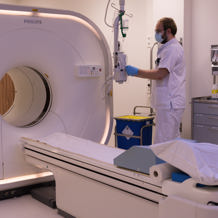Bladder cancer - muscle invasive
Muscle-invasive bladder cancer has various stages, and your treatment will depend on the stage of your tumor. A tumor that has grown into the muscle wall is called muscle-invasive bladder cancer. A tumor that grows in the bladder tissue but not into the bladder muscle is called non-muscle invasive bladder cancer.
Visit our NKI Bladder Cancer Center for more information about our expertise, specialists, patient satisfaction rates, news, and innovation.
Find out more about the symptoms and the most commonly used diagnostic tests and treatment types for muscle-invasive bladder cancer on this page.
Symptoms
Bladder cancer (usually) develops slowly that does not cause symptoms immediately. The tumor is usually discovered on accident. Blood in the urine is never a good sign, so please see your physician if this happens to you.
Especially women with bladder cancer experience blood in the urine and recurring urinary tract infections. If you experience these symptoms, please see your general physician for a referral to the hospital for diagnostic tests.
Symptoms that could signify a late-stage muscle invasive bladder tumor:
- pain in the pelvis
- pain in the flank
- weight loss
- noticeable mass in the lower abdomen
Rapid diagnostics
It will take approximately eight days before you can start rapid diagnostics
Diagnosis
If bladder cancer is suspected or if you are at risk of developing bladder cancer, you will need to undergo several diagnostic tests in order to diagnose or rule out bladder cancer. Your general physician can refer you to a urologist. This will happen if blood is found in your urine, or if your medical history is a cause for concern. Your medical history and urinary test alone are not enough to reach a diagnosis. The following tests can be done to reach a diagnosis:
Treatment options
1) local and locally-advanced bladder cancer.
2) metastatic bladder cancer.
Treatment options for metastatic bladder cancer
Cancer that returns to the other organs or lymph nodes outside of the groin is called metastatic cancer. At this stage, the treatment no longer aims to cure you but can alleviate the symptoms (palliative treatment). This treatment aims to halt the cancer and keep the symptoms under control. Which palliative treatment is right for you, depends on your symptoms and wishes. We have multiple palliative treatments available. Chemotherapy and radiotherapy are commonly used, as is a combination of the two (chemoradiation). In the case of pain, we can offer a radical cystectomy as part of palliative care.
Support in your decision
Selecting a treatment, or opting out of treatment entirely, ca be a tough decision to face. It is important to us that our patients have a clear understanding of the effects of the treatment at their stage, and what the effects are on their quality of life. It may help to discuss all your options and considerations with close family and friends. Peer groups at the patient network and health care professionals at the Survivorship Center can support you during this time.
Checkups
After every cancer treatment, follow-up screenings are essential to minimize complications and to detect and treat potential recurrences early. The first check-up appointment will be three months after your treatment. You will schedule the remaining consultations with your urologist. Your urologist can also answer all your questions about your illness or related topics.
Aftercare
Bladder cancer can significantly affect the lives of patients and their loved ones. Bladder cancer patients often face specific problems with urination or sexuality as well as general side effects of cancer and its treatment, like fatigue, pain, social limitations, and mental health issues like anxiety or uncertainty. You can find support at our Survivorship Center.
 nl
nl
 Nederlands (Nederland)
Nederlands (Nederland)
 English (United States)
English (United States)



